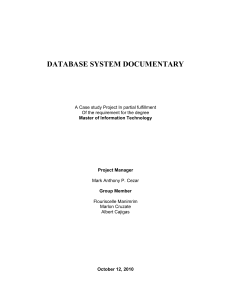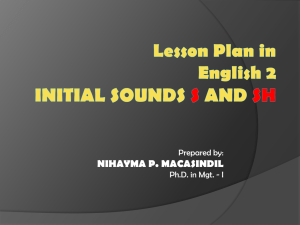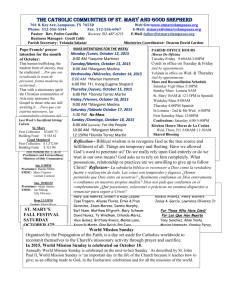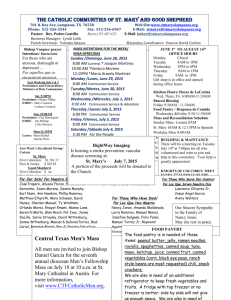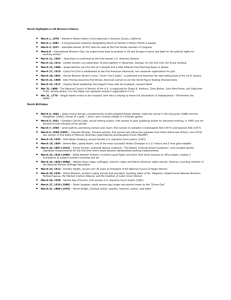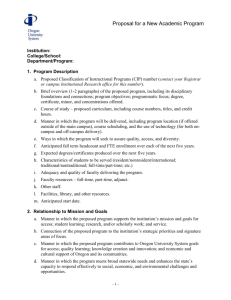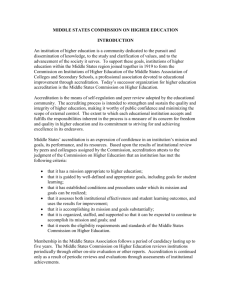The Case of Olivarez College
advertisement
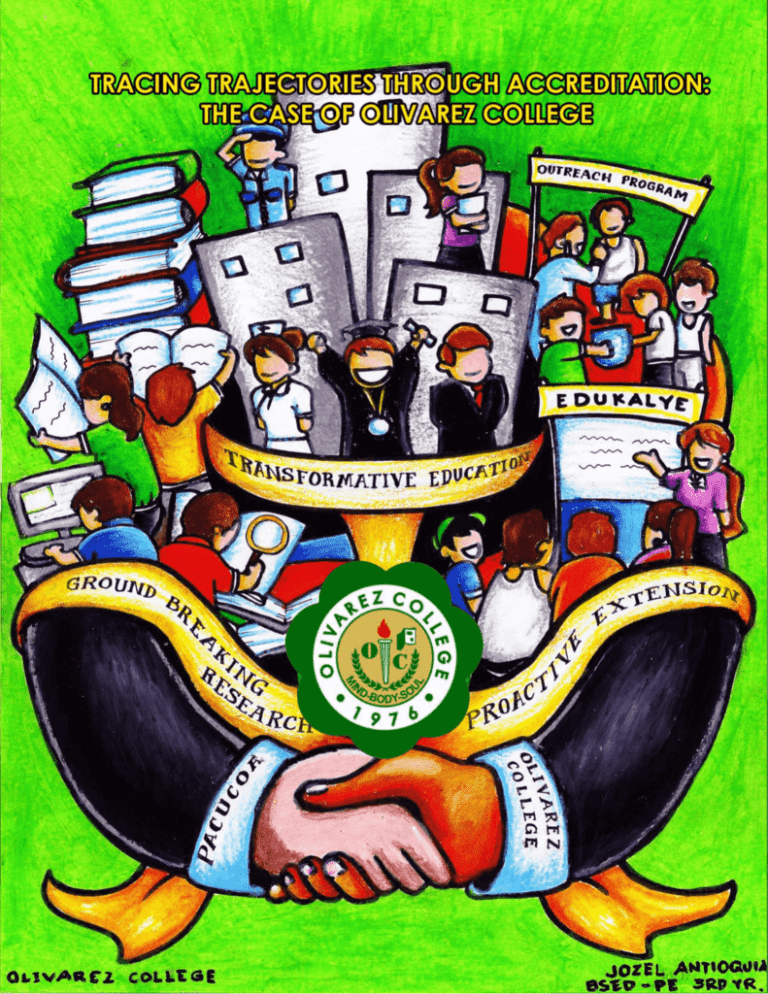
INSTITUTIONAL PROFILE Institutional Profile Olivarez College is a private, non-sectarian, and stock-profit educational institution conceived and established in the belief that providing educational opportunities for the masses is the best legacy one can offer to the Filipino nation and the world. Olivarez College is committed to the intellectual, cultural, moral, and physical development of its student. It also envisions the enhancement of the welfare and social well-being of the community. The school is dedicated to the youth of the land eager to search for educational opportunities and challenges for responsible citizenship and leadership by developing the potentials of the youth to the end fruition of their learned skills and competences, thus, enabling them to become assets of the nation and global community. Historical Evolution of Olivarez College When Sucat Road, Paranaque was still surrounded with rice fields and salt beds, Dr. Pablo and the late Dr. Rosario Olivarez pioneered in the development of the community when they put up Olivarez General Hospital in 1975. The following year, the spouses envisioned to establish a school in which its graduates shall be immediately hired in the said hospital and, at the same time, contribute in the formation of the youth dedicated to the service of God, country and man. Being medical practitioners themselves who were aware of the great demand for nurses in the Philippines and abroad, they established the Olivarez School of Nursing on April 30, 1976. Due to a dramatic increase in the student's enrollment the following year, additional programs like Liberal Arts and vocational courses were offered. The name Olivarez School of Nursing was changed to Olivarez Junior College. In 1978, it instituted the College of Liberal Arts and Sciences, College of Commerce and other Health Related Courses. The demand to open a preschool and grade school prompted the owners to offer them in. the same year. The school began accepting high school students in the following year. In 1980, the school changed its name to Olivarez College and has kept the prestigious name until now. OLIVAREZ COLLEGE INSTITUTIONAL PROFILE Originally, the school was situated in a one-hectare four-storey building where in the first floor was used as the canteen, the second floor as the nursing laboratory and classrooms, the third floor as the library and the fourth floor as the dormitory. Together with Mrs. Arceli Adriano, Mrs. Marilou I. Aguirre, Mrs. Ruth Glori, Mrs. Petronilia Ignacio, Mrs. Teresita R. Oris, and five (5) faculty members, the school opened its doors for its first eighty-four (84) enrollees. The year 1977 marked a dramatic increase in the students' enrollment. This triggered the offering of additional academic courses and programs like Liberal Arts and other vocational courses. Olivarez School of Nursing was later named Olivarez Junior College with Mrs. Petronila Ignacio as the first Academic Vice-President, More departments were established in the year 1978. These were the College of Arts and Sciences, College of Commerce and other paramedic courses. The elementary department with the kindergarten and grade one classes were also set-up. The school began accepting first and second year high school students in school year 1979. It also started to offer complete elementary courses from grades one to six. The Academic Council was organized and was composed of the Executive Vice-President, Dean of the College Department and the department heads. Third and fourth year high school students were admitted in the following year. It was also in 1980 that the school named itself Olivarez College. Dr. Pablo Olivarez purchased a two (2)-hectare lot adjacent to Olivarez General Hospital. This became the present site of the two-storey high school building which was completed in 1979, and the four-storey building which construction was finished in 1980. OLIVAREZ COLLEGE INSTITUTIONAL PROFILE In 1992, the school started offering graduate programs: Master of Arts in Education, major in Educational Management, Master of Arts in Education, major to Guidance and Counseling, and Master of Business Administration. Quality education has always been a thrust of the school. Thus, in October 1990, the school formally wrote the Philippine Association for Colleges and Universities on Accreditation (PACUCOA) requesting the said group of accreditors to orient the school administration regarding the process of accreditation. The PACUCOA team came in February 1991 for a consultation meeting with the administration, faculty, and staff. Level I accreditation status was formally awarded to the College of Liberal Arts and Commerce in July 1992. The College of Nursing was likewise granted similar accreditation status on Septembers, 1992. OnMay28, 1993, the College of Commerce and Liberal Arts were granted by PACUCOA their Level II accreditation status. The College of Nursing followed on February 7, 1997. Level II First re-accreditation status was granted to the College of Liberal Arts and Commerce on December 1998. At present, the College of Liberal Arts, College of Commerce and College of Nursing enjoy Level II, second re-accreditation status for five years. PACUCOA likewise gave notice to the compliance to its accreditation standards of the Master of Arts in Education Program and Master of Business Administration of Olivarez College of Parañaque. On May 31, 2008, it was given a candidate status. Same is true with the Bachelor of Secondary Education, Bachelor of Elementary Education, and Bachelor of Science in Hotel and Restaurant Management. On the other hand, In February 2002, the Grade School and High School Departments collectively called the Basic Education Department were awarded Level I accredited status by the Philippine Accrediting Association of Colleges and Universities (PAASCU). On May 14, 2004, PAASCU awarded once again the Basic Education Department its Level II accredited status for having satisfactorily met its requirements and standards. Four years after, on May 5, 2008, PAASCU granted the Basic Education Department the Level II re-accredited status for 5 years, valid until May 2013. On April 1995, the school opened the year under a new administration. Two (2) of Olivarez's children Dr. Eric L. Olivarez and Mrs. Evangeline O. Ilas assumed the positions of Vice Presi- OLIVAREZ COLLEGE INSTITUTIONAL PROFILE dent for Academics and Services and Vice President for Finance and Administration, respectively. Also in June of the same year, a four (4) storey structure especially intended for the Basic Education Department was formally completed. At present, it contains its own cafeteria, home economics, practical arts, science and computer laboratories, audio-visual room, libraries and classrooms. Perhaps, no other school or universities in the Philippines can outdo the athletic facilities of Olivarez College. The five (5) indoor and one (1) outdoor tennis courts are comparable to leading country clubs in the country, not to mention the twenty five (25) indoor badminton courts. The semi-Olympic sized indoor swimming pool is one of a kind. The five thousand (5,000) seating capacity coliseum is also state-of-the-art. The school prides itself with its own resort that offers leisure and serenity for the students, faculty, staff, and visitors alike. In 2008 the new building which houses the College of Business, College of Arts and Sciences, and the main library, apart from the three (3) other libraries has been completed. The areas of faculty and instruction are just two (2) of the attestations of the accolades of Olivarez College. A highly qualified and competent faculty pool is maintained. Majority of the professors in the College Department attained their graduate degrees from prestigious colleges and universities. In the Basic Education Department, all teachers have passed the Licensure Examinations for Teachers (LET). Faculty members incessantly pursue their quest for learning through research which the school administration supports through the allotment of annual budget for research. Consistently, the average passing rate of the students in the National Board Examinations is over and above average the national passing rate especially in Radiologic Technology, Midwifery, Physical Therapy, Nursing, and Education. Many of the Olivarian graduates are now gainfully employed in the country and abroad. These are only but proofs of the Olivarian excellence. The extent that the school facilities, services, and resources support the school's objectives certainly passes the test of excellence. Olivarez College is committed to and is an active participant in community services, growth and development. The school has established linkages with various colleges, universities, agencies, and other institutions. Residents of Sitio Sto. Nino located in San Dionisio, Parañaque City was the beneficiaries of the various outreach programs of the OLIVAREZ COLLEGE INSTITUTIONAL PROFILE school. Moreover, a free preschool program is offered to the children of this adopted community. Likewise, they avail of the use of some of the school facilities. Other community programs include cleaning and greening, livelihood and entrepreneurship, computer literacy, health and sanitation, and physical and spiritual development. Olivarez College-Paranaque offers pre-school, grade school, high school, college and graduate school programs. The programs in the College of Arts and Sciences are AB Psychology, AB Political Sciences and AB Mass Communication while the programs In the College of Education Include BSED major in Physical Education, English, Filipino, BEED and Teacher Certificate Program. On the other hand, Bachelor of Science in Commerce (BSC) major in Operations Management and Marketing Management, Associate in HRM, and BS Hotel and Restaurant Management, BS Tourism and BS Computer Science are offered in the College of Business. In the College of Health Related Sciences, BS Nursing, Associate in Radiologic Technology, BS Radiologic Technology, BS Physical Therapy and Midwifery are offered. Graduate school courses include Master of Business Administration, Master of Arts in Education Major in Educational Management and Master of Arts in Education major in Guidance and Counseling. All program offerings of Olivarez College are recognized by the Commission on Higher Education (CHED), Department of Education (DepEd), and Technical Education and Skills Development Authority (TESDA). Since its humble beginnings in 1976, Olivarez College has been true to its vision of providing a holistic education to Its students. Like a blossoming flower, it has metamorphosed into a premiere educational institution in the south of Metro Manila. The intent to be in the league of leading universities in the country impels it to move towards excellence. To achieve this goal of excellence, the school constantly upgrades its standards. Olivarez College has been successful in its philosophy of "educating the mind, body and soul" for its students. The school administrators are working towards its goal of making Olivarez College achieve university status. Becoming a high-performing school takes many years of hard work. There is no silver bullet. There is no single thing Olivarez College can do to ensure high student performance. Olivarez College does not rest on its laurels. It continuously labors to achieve a state of distinction. This can only be achieved through the concerted efforts of each and every member of the Olivarian community. OLIVAREZ COLLEGE PHILOSOPHY OF OLIVARIAN EDUCATION Philosophy of Olivarian Education Olivarian education endeavors to combine the best in human and Christian tradition with awareness of, and involvement in the present day demands of national and global development. The earnest striving for self-realization is, therefore, directed to find its fulfillment in responsible service that will significantly contribute to the common effort towards national and global development. Vision Olivarez College strives to become a global university that excels in transformative education, groundbreaking research, and proactive extension. Mission To generate applicable knowledge, cultivate essential skills, and instill Christian values among all stakeholders to support social and economic advancement Goals Olivarez College aims to have: a quality and diverse body of students; a holistic and responsive educational program with a multicultural orientation; a highly competent faculty and support staff; a balanced curriculum responsive to societal needs; state-of-the-art facilities; efficient and effective administrative systems; a supportive and involved alumni; a pulsating culture or research; OLIVAREZ COLLEGE CORE VALUES = H.E.A.R.T. strong local and international linkages and collaborations; and globally employable graduates Core Values = H.E.A.R.T. The academic capacity and vitality of Olivarez College flow from, and are nourished by the core values which underpin the Strategic Plan, and are reflected in all Olivarez College activities. Honesty Honesty and high ethical standards will inform all actions of Olivarez College as an academic enterprise dedicated to scholarship, discovery and creativity. Excellence Olivarez College is committed to building excellence throughout its educational, research and outreach programs. Accountability A sustained commitment to openness and accountability is critical to Olivarez College’s success as a public institution of international standing. Responsible Enquiry The freedom and responsibility of all stakeholders to engage in critical enquiry and intellectual discourse is vital to the advancement of the frontiers of knowledge and the pursuit of higher truths. Teamwork We seek to create interdisciplinary, synergistic and collegial relationships characterized by honesty, collaboration, inclusiveness and flexibility. OLIVAREZ COLLEGE SIGNIFICANT ACHIEVEMENTS, BEST PRACTICES, AND OUTCOMES OLIVAREZ COLLEGE - GRADUATE SCHOOL Master of Arts in Education and Master in Business Administration PRE—ACCREDITATION AREA POST—PACUCOA ACCREDITATION Very few faculty members avail themselves of incentives and benefits for faculty researches, journal articles and publications. Information on research assistance and incentives for journal articles, researches, publications, and paper presentations as stipulated in the Research Manual was disseminated to the faculty through memorandum circulation, postings, and orientation as an agendum in the faculty meeting. In effect, faculty researchers enjoyed the said benefits and incentives. The substitution scheme and forms for monitoring and tracking faculty members who are absent or on-leave are not maximally utilized. The substitution form for absent faculty members or those on leave was designed and was thereby, instituted toward systemic class monitoring and regulation in the Graduate School. FACULTY Library book acquisition do not fully respond to faculty needs. Pertinent book acquisitions and request forms filled-out by faculty with proper signatories were transacted and mobilized. Sharing by the faculty of their knowledge and expertise with the institution and the school community was not evident. The Graduate School included professional sharing in faculty meetings and other related assemblies which entailed sharing of learning insights and experiences from various faculty members who attended for a and conferences regarding latest trends and innovations in the field of educational management. There was no evidence on the full utilization of the existing consultation room. Policies and procedures on the utilization and maximization of consultation room were formulated and disseminated during faculty meeting and were circulated through a memorandum and posted in the consultation room. OLIVAREZ COLLEGE SIGNIFICANT ACHIEVEMENTS, BEST PRACTICES, AND OUTCOMES PRE—ACCREDITATION AREA POST—PACUCOA ACCREDITATION The MAEd curriculum adopts only the CHED minimum requirements. Upon curriculum review and revision of subjects, inclusion of subjects based on students’ needs with regard to honing their research capabilities was considered. Learning activities in the course syllabi do not contribute optimally to the achievement of the course objectives. Class activities stated in the syllabi were reformulated in such a way that they contributed to the realization Of the course objectives. Networking needs improvement to be effective. Networking and collaboration schemes were revitalized making them more dynamic and functional. CURRICULUM & INSTRUCTION Minutes of meetings of the curriculum committee do not document accurately the salient matters discussed. The format of the curriculum committee minutes of the meeting was redesigned for further improvement. Limited exposure to handson experience among students, particularly those who major in Guidance and Counseling was observed. Exposure activities and hands-on experience for Guidance and Counseling were facilitated (i.e. Guidance Office visitation, test administration, analysis and assessment, and counseling activities). There is no subject in the MAEd curriculum that prepares the student to the scientific way of designing a notable thesis proposal. Students’ research capabilities were honed through the conduct of related seminars, fora and colloquia, pre-thesis writing orientation and training (for those enrolled in Thesis Writing 1) which supplemented the course in Method of Research and other research-based subjects. OLIVAREZ COLLEGE SIGNIFICANT ACHIEVEMENTS, BEST PRACTICES, AND OUTCOMES OLIVAREZ COLLEGE - GRADUATE SCHOOL Level 1 Formal Visit-Master of Business Administration PRE—ACCREDITATION AREA POST—PACUCOA ACCREDITATION There were limited evidences of regular utilization of research findings. A monitoring scheme regarding the dissemination of research findings and implementation of research outputs among concerned beneficiaries who in turn provided feedback and outcomes was formulated. Involvement of faculty in the development of research-based instructional materials was limited. The committee on Instructional Material Development was organized to further enhance effective instruction. RESEARCH As indicated in the research outputs of faculty and students there is a need to improve on: Thesis orientation and lecture program were facilitated to prepare students for thesis writing. More so, research capability building seminar series for students were conducted. standard research format organization use of appropriate methodologies. Congruence between the specific problems and the findings and between findings and conclusions. There is no evidence that Research is an integral part of all course requirements Edited research reports and outputs were published in an annual basis in a student research journal. There was no evidence available to show that the students participated in curriculum revision and enrichment. Students’ involvement in the curriculum review and revision was properly documented and stated in the minutes of the curriculum committee consultation and orientation. The students need expert faculty/staff assistance in organizing the computer-generated data processing to be able to interpret adequately the findings of their data gathering. STUDENTS The Center for Research and Publication facilitated the processing and evaluation of all the research data through collaboration and consultation with the research committee composed of experts and specialists for review and evaluation. OLIVAREZ COLLEGE SIGNIFICANT ACHIEVEMENTS, BEST PRACTICES, AND OUTCOMES PRE—ACCREDITATION AREA POST—PACUCOA ACCREDITATION There are minimal linkages with local and international educational institutions and professional associations The school established active linkages and strong collaboration with consortium of institutions and professional organizations in both national and international levels through affiliations, officership opportunities, sharing of resources, and benchmarking activities. There are limited grants and endownments to support worthy academic pursuits of faculty members, students and employees. The Alumni Association provided assistance for scholarships and research grants to the members of the association who were pursuing continuing graduate education. More so, the same association provided support to various student programs, outreach services, and benchmarking activities. ADMINISTRATION The documents on planning show that the college and department concerns were limited to routine operations on quality assurance and not strategic to an identified vision for the institution in the foreseeable future. The school through the initiative of the Center for Planning and Development conducted and facilitated strategic planning sessions among administrators that included SWOT analysis and visioning activity. The responsibility of coordinating strategic plans, regularly evaluating Key Performance Indicators (KPI), and monitoring annual operational plans is not assigned to a particular official or office. A Director for Planning and Development was designated to implement the monitoring and evaluation of strategic and operational plans. OLIVAREZ COLLEGE SIGNIFICANT ACHIEVEMENTS, BEST PRACTICES, AND OUTCOMES PRE—ACCREDITATION AREA POST—PACUCOA ACCREDITATION While services of student assistants were employed in the library, policies and procedures that will cover them were not included in the provisions of the Manual of Procedures. The Library Manual of Procedures was reviewed and revised to include policies and procedures regarding student assistants. Continuous acquisition of updated books was done. Some books in the general collection were not updated. LIBRARY The Director of Information and Learning Resource Center performs librarian functions, but has not earned a Master’s degree in Librarianships. A new Director for the Information and Learning Resource Center who has a Master’s degree on Library Science was designated. Laboratory material are not properly stacked and labeled. A system of stacking and labeling the laboratory materials was devised and implemented. LABORATORY A very low percentage of graduate students used the testing and guidance services of the graduate school. OTHER SERVICES The Guidance and Counseling Office provided assistance to students majoring in Guidance and Counseling in utilizing the tests, assessing and interpreting test results, and providing data for related research endeavors other than those regularly offered services and assistance (i.e. counseling, testing, evaluation, and placement). OLIVAREZ COLLEGE SIGNIFICANT ACHIEVEMENTS, BEST PRACTICES, AND OUTCOMES OLIVAREZ COLLEGE - COLLEGE OF EDUCATION Bachelor of Secondary and Elementary Education PRE—ACCREDITATION AREA POST—PACUCOA ACCREDITATION Work schedule of faculty members did not indicate consultation time with students outside the teaching hours. Consultation time was indicated in the faculty loading. More so, consultation sessions became evident with pertinent documents. The teaching assignments of several faculty members exceeded 4 subject preparations. The faculty members had a minimum of four (4) preparations as per indicated in the faculty loading. FACULTY Provision for sabbatical leave for teachers did not stipulate the financial benefits that the grantee is expected to receive. The provision on sabbatical leave was stated in the Faculty Manual including financial benefits, terms and conditions. The five-year development plan did not indicate even a tentative list of prospective candidates who are qualified to avail of sabbatical leave to further enhance the teachers’ professional growth and development. The college provided a list of qualified candidates for sabbatical leave as part of faculty development program and as an incentive for the latter’s loyalty to the institution. OLIVAREZ COLLEGE SIGNIFICANT ACHIEVEMENTS, BEST PRACTICES, AND OUTCOMES PRE—ACCREDITATION AREA POST—PACUCOA ACCREDITATION Some subject offering did not follow logical sequencing. Curriculum review for Bachelor of elementary Education (BEEd) Program was conducted thereby, led to the revision of the existing curricula with emphasis on appropriate sequencing of subjects. The number of subjects offered in the last semester was two heavy, considering that the students were supposed to do their practice teaching during this term. As part of the curriculum revision, subjects were equally distributed in all year levels in order to give enough time for their practice teaching experience. Moreover, a summer term was encouraged and advised to students on their third year in order to reduce their loads on the succeeding semester, however, it cannot be compelled to students due to financial constraints. The College of Education developed a Practice Teaching Manual that would serve as guide and reference for student teachers, the supervisors, and cooperating teachers in the conduct of practice teaching activities. Further, this was in consultation with the DepEd and was reviewed by educators from other TEIs. Some test items did not challenge the analytical and critical thinking of students. Faculty members were oriented on effective test construction techniques and principles as part of faculty development concomitant to learning assessment. More so, some teachers were sent to outside seminars at par with test construction principles and assessment. As a result, teachers produced quality metacognitive test items which were also subjected for item analysis. Moreover, test drafts are configured and checked by coordinators, academic and program heads, the dean and CTE director before administering to students. Some faculty members had not yet conducted researches that would enrich their teaching. Faculty members conducted both individual and team researches along with their respective areas of which findings were used to further their teaching. There was no Practice Teaching Manual to guide the students and the supervisor handling student teaching. INSTRUCTION OLIVAREZ COLLEGE SIGNIFICANT ACHIEVEMENTS, BEST PRACTICES, AND OUTCOMES OLIVAREZ COLLEGE Bachelor of Science in Hotel & Restaurant Management PRE—ACCREDITATION AREA POST—PACUCOA ACCREDITATION Earned graduate degrees of the HRM faculty members were not aligned with/ relevant to their undergraduate degrees. The scheme hired faculty members who have aligned / articulated graduate degrees. More so, faculty members are currently pursuing graduate studies in line with their baccalaureate degrees and expertise. Statistical reports on the students and faculty members’ utilization of the library/learning resources bore no signature as to who prepared and approved such documents. All statistical reports prepared by the library director were properly signed. Latest statistical reports on HRM faculty members’ utilization of HRM magazines / journals only included four titles as opposed to the inventory list, which included many more titles. Faculty members were encouraged to read and use professional magazines and journals with their field that would supplement their teaching; hence, the list of newly purchased / subscribed journals and magazines is posted on bulletin boards in addition to the e-journals availed of by the school. FACULTY Records to show faculty consultation with students were not available. A logbook that contains consultation entries and the consultation slips duly signed by both the students and faculty member was documented. The faculty loading indicates consultation hours/ schedule. Thus, consultation session became evident with pertinent documents. Completed faculty researches were not presented in any research forum. Faculty members conducted researches along with their areas of specialization. The researches made were presented to institutional research colloquim. Documented faculty development program did not show evidences of scholarships, fellowships, and study grants for faculty members. The school entered into the Consortium of the OLIVAREZ COLLEGE South towards collaborative partnership and strong linkages with provison for faculty, staff, and student exchanges as stated in the MOA duly transacted for this purpose. SIGNIFICANT ACHIEVEMENTS, BEST PRACTICES, AND OUTCOMES PRE—ACCREDITATION AREA POST—PACUCOA ACCREDITATION There was no evidence that the HRM faculty members are utilizing instructional materials such as CDs, DVDs and CD-ROMS. These materials are not included or reflected in the syllabi. Faculty members continuously utilize instructional materials purchased by the school and are available at Instructional Media Services Center. The use of such is also indicated in the syllabi intended for the respective courses. Correlation studies on students’ performance were practically nil. Active researches aimed at ensuring the effective delivery of the education process through program and curriculum evaluation, teaching and learning assessment, monitoring scheme and quality assurance were collaboratively earned out by the HRM faculty and the Guidance and Testing Center. A number of documents exhibited (e.g. statistical reports and albums) were not properly labeled and / or captioned. It was observed that the grading system / manner of computing the grades was the same regardless of the nature of the subjects. The computation of the final grade including the criteria / rubric for specific skills is indicated in the course syllabi intended for respective courses which is oriented to the students at the start of the class. For the practicum, the manner of grading was not specified in the syllabi. It was not clear as to the requirements, the assessment tools employed and the components of the final grade. The computation of grade for the practicum is indicated in the syllabus and practicum program file it entails rubrics with reasonable weight for performance rating given by training supervisor and other components such as narrative reports and by portfolio. The absence of a training plan in support of the MOA was noted. Training plans for both restaurant and hotel phases of the practicum were developed by the industry partner and the school to ensure high quality of training. It is supported by the memorandum of agreement (MOA). INSTRUCTION Documents and reports are properly labeled for monitoring and evaluation purposes. OLIVAREZ COLLEGE SIGNIFICANT ACHIEVEMENTS, BEST PRACTICES, AND OUTCOMES PRE—ACCREDITATION AREA POST—PACUCOA ACCREDITATION The under bar and over bar were not functional. Faculty members continuously utilize instructional materials purchased by the school and are available at Instructional Media Services Center. The use of such is also indicated in the syllabi intended for the respective courses. The front desk equipment and amenities were inadequete. Active researches aimed at ensuring the effective delivery of the education process through program and curriculum evaluation, teaching and learning assessment, monitoring scheme and quality assurance were collaboratively earned out by the HRM faculty and the Guidance and Testing Center. The duration of the Micros Fidelio Seminar given at the Tagaytay Country Hotel was very limited. Some equipment in the kitchen were not used for cooking / culinary purposes. LABORATORY Documents and reports are properly labeled for monitoring and evaluation purposes. Some working tables in the food laboratory as well as in the resto-bar extension kitchen were made of wooden materials The computation of the final grade including the criteria / rubric for specific skills is indicated in the course syllabi intended for respective courses which is oriented to the students at the start of the class. The stoves (particularly the heavy duty ones) were not provided with hoods. The computation of grade for the practicum is indicated in the syllabus and practicum program file it entails rubrics with reasonable weight for performance rating given by training supervisor and other components such as narrative reports and by portfolio. Ventilation in the stockroom and the lecture room located at the mezzanine floor of the kitchen was poor. Training plans for both restaurant and hotel phases of the practicum were developed by the industry partner and the school to ensure high quality of training. It is supported by the memorandum of agreement (MOA). Industry immersions and other forms of experiential learning activities were limited. Industry immersion like hotel exposure, cruise line and airline training, plant tour and career orientation was included in the syllabi as part of the culminating activity of the course. OLIVAREZ COLLEGE FACILITIES COLISEUM BADMINTON SPORTS CENTER TENNIS SPORTS CENTER INDOOR SWIMMING POOL OLIVAREZ COLLEGE FACILITIES OC CHAPEL GUIDANCE AND TESTING CENTER CHEMISTRY LABORATORY OLIVAREZ COLLEGE FACILITIES LIBRARY FITNESS CENTER COMPUTER LABORATORY OLIVAREZ COLLEGE FACILITIES CLINIC CANTEEN RESORT OLIVAREZ COLLEGE FACILITIES
